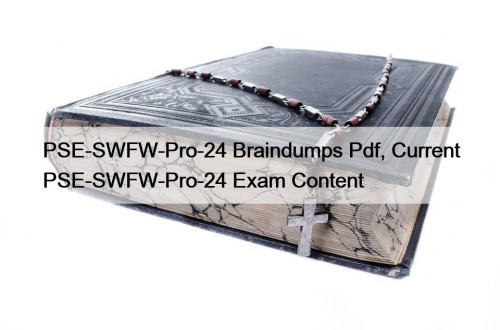Most Popular
 PSE-SWFW-Pro-24 Braindumps Pdf, Current PSE-SWFW-Pro-24 Exam Content
PSE-SWFW-Pro-24 Braindumps Pdf, Current PSE-SWFW-Pro-24 Exam Content
As the quick development of the world economy and intense ...
 C-BCBAI-2502 Training Materials & C-BCBAI-2502 Dumps PDF & C-BCBAI-2502 Exam Cram
C-BCBAI-2502 Training Materials & C-BCBAI-2502 Dumps PDF & C-BCBAI-2502 Exam Cram
Many people are afraid of walking out of their comfortable ...
 Learning CKS Materials & CKS Reliable Exam Preparation
Learning CKS Materials & CKS Reliable Exam Preparation
P.S. Free 2025 Linux Foundation CKS dumps are available on ...



Learning CKS Materials & CKS Reliable Exam Preparation

P.S. Free 2025 Linux Foundation CKS dumps are available on Google Drive shared by CramPDF: https://drive.google.com/open?id=1LdLAW4JfpMHiK8Gv9bwWa-THSdHaJ0cJ
Our CKS desktop practice test software works after installation on Windows computers. The Certified Kubernetes Security Specialist (CKS) CKS web-based practice exam has all the features of the desktop software, but it requires an active internet connection. If you are busy in your daily routine and cant manage a proper time to sit and prepare for the CKS Certification test, our CKS PDF questions file is ideal for you. You can open and use the CKS Questions from any location at any time on your smartphones, tablets, and laptops. Questions in the Certified Kubernetes Security Specialist (CKS) CKS PDF document are updated, and real.
The CKS exam is designed to assess the candidate's proficiency in security best practices for Kubernetes platforms and containerized workloads, including securing Kubernetes components, securing container images and registries, securing network communication, and configuring security contexts. CKS exam is a performance-based test, which means that the candidate must complete a series of tasks in a live Kubernetes environment, demonstrating their ability to secure Kubernetes platforms and containerized workloads.
The CKS Exam is a hands-on, performance-based exam that requires the candidate to demonstrate their skills by completing a series of tasks using a live Kubernetes cluster. CKS exam is proctored and can be taken online from anywhere in the world. Candidates have two hours to complete the exam and must achieve a passing score of 66% or higher to earn the certification.
Hot Learning CKS Materials | Well-Prepared CKS Reliable Exam Preparation: Certified Kubernetes Security Specialist (CKS)
CramPDF is a legal authorized company offering the best Linux Foundation CKS test preparation materials. So for some candidates who are not confident for real tests or who have no enough to time to prepare I advise you that purchasing valid and Latest CKS Test Preparation materials will make you half the efforts double the results. Our products help thousands of people pass exams and can help you half the work with double the results.
Linux Foundation Certified Kubernetes Security Specialist (CKS) Sample Questions (Q25-Q30):
NEW QUESTION # 25
Secrets stored in the etcd is not secure at rest, you can use the etcdctl command utility to find the secret value for e.g:- ETCDCTL_API=3 etcdctl get /registry/secrets/default/cks-secret --cacert="ca.crt" --cert="server.crt" --key="server.key" Output
Using the Encryption Configuration, Create the manifest, which secures the resource secrets using the provider AES-CBC and identity, to encrypt the secret-data at rest and ensure all secrets are encrypted with the new configuration.
Answer:
Explanation:
ETCD secret encryption can be verified with the help of etcdctl command line utility.
ETCD secrets are stored at the path /registry/secrets/$namespace/$secret on the master node.
The below command can be used to verify if the particular ETCD secret is encrypted or not.
# ETCDCTL_API=3 etcdctl get /registry/secrets/default/secret1 [...] | hexdump -C
NEW QUESTION # 26
SIMULATION
Before Making any changes build the Dockerfile with tag base:v1
Now Analyze and edit the given Dockerfile(based on ubuntu 16:04)
Fixing two instructions present in the file, Check from Security Aspect and Reduce Size point of view.
Dockerfile:
FROM ubuntu:latest
RUN apt-get update -y
RUN apt install nginx -y
COPY entrypoint.sh /
RUN useradd ubuntu
ENTRYPOINT ["/entrypoint.sh"]
USER ubuntu
entrypoint.sh
#!/bin/bash
echo "Hello from CKS"
After fixing the Dockerfile, build the docker-image with the tag base:v2 To Verify: Check the size of the image before and after the build.
- A. Send us the Feedback on it.
Answer: A
NEW QUESTION # 27
Create a RuntimeClass named gvisor-rc using the prepared runtime handler named runsc.
Create a Pods of image Nginx in the Namespace server to run on the gVisor runtime class
Answer:
Explanation:
Install the Runtime Class for gVisor
{ # Step 1: Install a RuntimeClass
cat <<EOF | kubectl apply -f -
apiVersion: node.k8s.io/v1beta1
kind: RuntimeClass
metadata:
name: gvisor
handler: runsc
EOF
}
Create a Pod with the gVisor Runtime Class
{ # Step 2: Create a pod
cat <<EOF | kubectl apply -f -
apiVersion: v1
kind: Pod
metadata:
name: nginx-gvisor
spec:
runtimeClassName: gvisor
containers:
- name: nginx
image: nginx
EOF
}
Verify that the Pod is running
{ # Step 3: Get the pod
kubectl get pod nginx-gvisor -o wide
}
NEW QUESTION # 28
Enable audit logs in the cluster, To Do so, enable the log backend, and ensure that
1. logs are stored at /var/log/kubernetes/kubernetes-logs.txt.
2. Log files are retained for 5 days.
3. at maximum, a number of 10 old audit logs files are retained.
Edit and extend the basic policy to log:
- A. 1. Cronjobs changes at RequestResponse
Answer: A
Explanation:
2. Log the request body of deployments changes in the namespace kube-system.
3. Log all other resources in core and extensions at the Request level.
4. Don't log watch requests by the "system:kube-proxy" on endpoints or
NEW QUESTION # 29
Fix all issues via configuration and restart the affected components to ensure the new setting takes effect.
Fix all of the following violations that were found against the API server:- a. Ensure the --authorization-mode argument includes RBAC b. Ensure the --authorization-mode argument includes Node c. Ensure that the --profiling argument is set to false Fix all of the following violations that were found against the Kubelet:- a. Ensure the --anonymous-auth argument is set to false.
b. Ensure that the --authorization-mode argument is set to Webhook.
Fix all of the following violations that were found against the ETCD:-
a. Ensure that the --auto-tls argument is not set to true
Hint: Take the use of Tool Kube-Bench
Answer:
Explanation:
API server:
Ensure the --authorization-mode argument includes RBAC
Turn on Role Based Access Control. Role Based Access Control (RBAC) allows fine-grained control over the operations that different entities can perform on different objects in the cluster. It is recommended to use the RBAC authorization mode.
Fix - Buildtime
Kubernetes
apiVersion: v1
kind: Pod
metadata:
creationTimestamp: null
labels:
component: kube-apiserver
tier: control-plane
name: kube-apiserver
namespace: kube-system
spec:
containers:
- command:
+ - kube-apiserver
+ - --authorization-mode=RBAC,Node
image: gcr.io/google_containers/kube-apiserver-amd64:v1.6.0
livenessProbe:
failureThreshold: 8
httpGet:
host: 127.0.0.1
path: /healthz
port: 6443
scheme: HTTPS
initialDelaySeconds: 15
timeoutSeconds: 15
name: kube-apiserver-should-pass
resources:
requests:
cpu: 250m
volumeMounts:
- mountPath: /etc/kubernetes/
name: k8s
readOnly: true
- mountPath: /etc/ssl/certs
name: certs
- mountPath: /etc/pki
name: pki
hostNetwork: true
volumes:
- hostPath:
path: /etc/kubernetes
name: k8s
- hostPath:
path: /etc/ssl/certs
name: certs
- hostPath:
path: /etc/pki
name: pki
Ensure the --authorization-mode argument includes Node
Remediation: Edit the API server pod specification file /etc/kubernetes/manifests/kube-apiserver.yaml on the master node and set the --authorization-mode parameter to a value that includes Node.
--authorization-mode=Node,RBAC
Audit:
/bin/ps -ef | grep kube-apiserver | grep -v grep
Expected result:
'Node,RBAC' has 'Node'
Ensure that the --profiling argument is set to false
Remediation: Edit the API server pod specification file /etc/kubernetes/manifests/kube-apiserver.yaml on the master node and set the below parameter.
--profiling=false
Audit:
/bin/ps -ef | grep kube-apiserver | grep -v grep
Expected result:
'false' is equal to 'false'
Fix all of the following violations that were found against the Kubelet:- Ensure the --anonymous-auth argument is set to false.
Remediation: If using a Kubelet config file, edit the file to set authentication: anonymous: enabled to false. If using executable arguments, edit the kubelet service file /etc/systemd/system/kubelet.service.d/10-kubeadm.conf on each worker node and set the below parameter in KUBELET_SYSTEM_PODS_ARGS variable.
--anonymous-auth=false
Based on your system, restart the kubelet service. For example:
systemctl daemon-reload
systemctl restart kubelet.service
Audit:
/bin/ps -fC kubelet
Audit Config:
/bin/cat /var/lib/kubelet/config.yaml
Expected result:
'false' is equal to 'false'
2) Ensure that the --authorization-mode argument is set to Webhook.
Audit
docker inspect kubelet | jq -e '.[0].Args[] | match("--authorization-mode=Webhook").string' Returned Value: --authorization-mode=Webhook Fix all of the following violations that were found against the ETCD:- a. Ensure that the --auto-tls argument is not set to true Do not use self-signed certificates for TLS. etcd is a highly-available key value store used by Kubernetes deployments for persistent storage of all of its REST API objects. These objects are sensitive in nature and should not be available to unauthenticated clients. You should enable the client authentication via valid certificates to secure the access to the etcd service.
Fix - Buildtime
Kubernetes
apiVersion: v1
kind: Pod
metadata:
annotations:
scheduler.alpha.kubernetes.io/critical-pod: ""
creationTimestamp: null
labels:
component: etcd
tier: control-plane
name: etcd
namespace: kube-system
spec:
containers:
- command:
+ - etcd
+ - --auto-tls=true
image: k8s.gcr.io/etcd-amd64:3.2.18
imagePullPolicy: IfNotPresent
livenessProbe:
exec:
command:
- /bin/sh
- -ec
- ETCDCTL_API=3 etcdctl --endpoints=https://[192.168.22.9]:2379 --cacert=/etc/kubernetes/pki/etcd/ca.crt
--cert=/etc/kubernetes/pki/etcd/healthcheck-client.crt --key=/etc/kubernetes/pki/etcd/healthcheck-client.key get foo failureThreshold: 8 initialDelaySeconds: 15 timeoutSeconds: 15 name: etcd-should-fail resources: {} volumeMounts:
- mountPath: /var/lib/etcd
name: etcd-data
- mountPath: /etc/kubernetes/pki/etcd
name: etcd-certs
hostNetwork: true
priorityClassName: system-cluster-critical
volumes:
- hostPath:
path: /var/lib/etcd
type: DirectoryOrCreate
name: etcd-data
- hostPath:
path: /etc/kubernetes/pki/etcd
type: DirectoryOrCreate
name: etcd-certs
status: {}
Explanation:






NEW QUESTION # 30
......
If you are still hesitate to choose our CramPDF, you can try to free download part of Linux Foundation CKS exam certification exam questions and answers provided in our CramPDF. So that you can know the high reliability of our CramPDF. Our CramPDF will be your best selection and guarantee to pass Linux Foundation CKS Exam Certification. Your choose of our CramPDF is equal to choose success.
CKS Reliable Exam Preparation: https://www.crampdf.com/CKS-exam-prep-dumps.html
- CKS Exam Score 💨 CKS Original Questions 🎆 CKS Exam Score 📆 Go to website ⏩ www.pass4leader.com ⏪ open and search for ( CKS ) to download for free 🧙CKS Reliable Test Syllabus
- Learning CKS Materials 100% Pass | Latest CKS Reliable Exam Preparation: Certified Kubernetes Security Specialist (CKS) 🙉 Download “ CKS ” for free by simply entering ➥ www.pdfvce.com 🡄 website 🐦New CKS Exam Review
- Pass Guaranteed Quiz Efficient Linux Foundation - Learning CKS Materials 🐍 Search for ➠ CKS 🠰 and download it for free on ▛ www.passtestking.com ▟ website 🈺CKS Review Guide
- Quiz CKS - Perfect Learning Certified Kubernetes Security Specialist (CKS) Materials 🔶 Search for ⏩ CKS ⏪ and obtain a free download on ➡ www.pdfvce.com ️⬅️ 🍙CKS New Dumps Ppt
- CKS PDF Download 🐗 CKS Reliable Test Syllabus 🤬 New CKS Exam Review ⏹ Easily obtain ➤ CKS ⮘ for free download through ⇛ www.pdfdumps.com ⇚ 💸CKS Reliable Braindumps Files
- Prepare with Actual CKS Exam Questions to Get Certified in First Attempt 🤽 Easily obtain ⇛ CKS ⇚ for free download through ➥ www.pdfvce.com 🡄 ☝CKS Valid Exam Papers
- Learning CKS Materials 100% Pass | Latest CKS Reliable Exam Preparation: Certified Kubernetes Security Specialist (CKS) 🕤 Download ➥ CKS 🡄 for free by simply entering ➡ www.testsdumps.com ️⬅️ website 🔉CKS Original Questions
- Examcollection CKS Questions Answers 🚡 CKS Real Question 💰 CKS Original Questions 💃 Search on 「 www.pdfvce.com 」 for [ CKS ] to obtain exam materials for free download 📍CKS Reliable Test Syllabus
- Pass Guaranteed Quiz Linux Foundation CKS - Certified Kubernetes Security Specialist (CKS) Pass-Sure Learning Materials 🚻 Search for ➽ CKS 🢪 and easily obtain a free download on ✔ www.prep4pass.com ️✔️ ⏮CKS Original Questions
- Linux Foundation CKS Exam Dumps - Latest Preparation Material [2025] 🟦 Open ⏩ www.pdfvce.com ⏪ and search for ▛ CKS ▟ to download exam materials for free 👗CKS Training Solutions
- CKS Vce Test Simulator 🛩 CKS Real Question 🧺 CKS Review Guide 🏬 Download “ CKS ” for free by simply searching on ➤ www.examdiscuss.com ⮘ 📻CKS New Dumps Ppt
- CKS Exam Questions
- 15000n-07.duckart.pro eeakolkata.trendopedia.in training.onlinesecuritytraining.ca www.sureprice.click credennz.in class.ascarya.or.id plataforma.catstreinamentos.com.br tiniacademy.com.br cyberversity.global class.dtechnologys.com
DOWNLOAD the newest CramPDF CKS PDF dumps from Cloud Storage for free: https://drive.google.com/open?id=1LdLAW4JfpMHiK8Gv9bwWa-THSdHaJ0cJ
Tags: Learning CKS Materials, CKS Reliable Exam Preparation, Exam CKS Revision Plan, New CKS Exam Fee, Valid Dumps CKS Questions